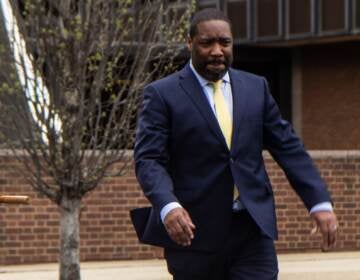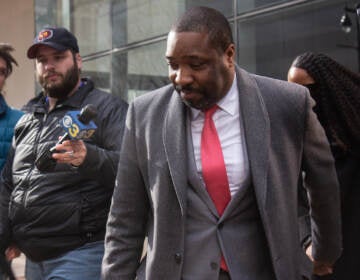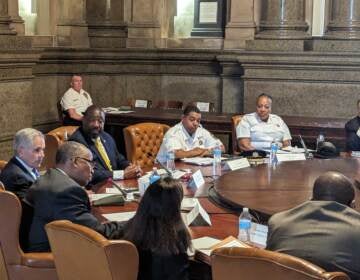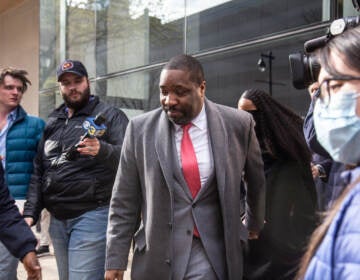Round two: September retrial set for Kenyatta Johnson and co-defendants
A federal judge declared a mistrial in April after the jury during Johnson’s first trial deadlocked over bribery charges.
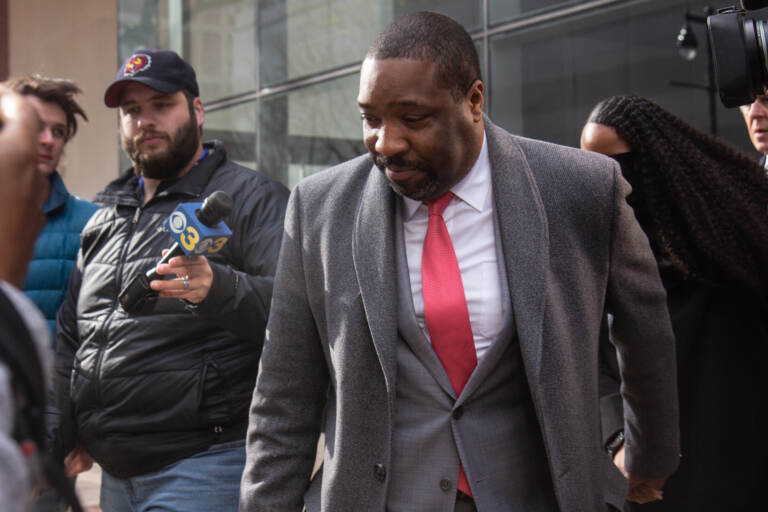
File photo: Philadelphia City Councilmember Kenyatta Johnson leaves federal court after the judge in his bribery trial declared a mistrial, following the jury's failure to reach a unanimous verdict, on April 19, 2022. (Kimberly Paynter/WHYY)
Philadelphia City Councilmember Kenyatta Johnson and three co-defendants are scheduled to be retried on federal bribery charges this fall, five months after U.S. District Judge Gerald A. McHugh declared a mistrial after a jury remained deadlocked.
Jury selection for Johnson’s second trial is scheduled to start Sept. 28, according to court records. McHugh will again preside over the case.
“We’re very disappointed in the government’s decision. We believe it’s unfortunate and questionable,” said Patrick Egan, Johnson’s lawyer. “There’s no evidence to support the government’s case.”
The government declined to comment.
Prosecutors say Johnson accepted nearly $67,000 in bribes from Universal Companies in exchange for a pair of political favors that benefited the prominent nonprofit, co-founded by music legend Kenny Gamble and his wife.
Both favors allegedly involved land that Universal — a real estate developer and charter school operator — owned in Johnson’s legislative district, including the historic Royal Theater on South Street.
The government further alleges that Universal got the bribe money to Johnson by concealing it as payments to a consulting company run by the lawmaker’s wife and co-defendant, Dawn Chavous. Prosecutors say Chavous did “very little” work for the company to prove otherwise.
Universal’s former CEO Abdur Rahim Islam and former CFO Shahied Dawan are charged alongside the couple.
Islam’s defense attorney, David Laigaie, declined to comment.
McHugh declared a mistrial after a jury deliberated for roughly 25 hours and could not reach a verdict.
During 10 days of testimony, the government presented a torrent of emails and financial documents, while questioning nearly 20 witnesses. The list included current and former Universal employees, prominent Philadelphia developer Carl Dranoff and outgoing schools Superintendent William Hite.
None of the case’s four defendants took the witness stand.
Prosecutors spent most of their case trying to prove that Chavous’ consulting contract with Universal was a charade in service of a bribery scheme. And that Universal and Johnson were both motivated by financial hardship.
Defense attorneys pushed back on all of it, mostly while cross-examining government witnesses.
They argued that Chavous’ contract with Universal was legitimate and that neither Johnson nor the nonprofit had any motivation, financial or otherwise, to participate in a bribery scheme, in part because Johnson and Universal had a history of “mutual support.”
WHYY is your source for fact-based, in-depth journalism and information. As a nonprofit organization, we rely on financial support from readers like you. Please give today.




